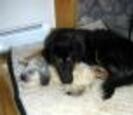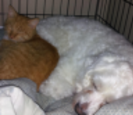Canine Care Guides
Ringworm
-
Despite the name, ringworm is not caused by worms, but by a fungus. Most infections in pets are caused by one of three types of fungi, the most common being Microsporum canis. The fungi invade the superficial layers of the skin, hair, and/or nails. Because fungi thrive in moist environments, these organisms are especially persistent in humid climates and damp surroundings.
Read More Rodenticide Poisoning
-
Rodenticide poisoning occurs when dogs and cats accidentally eat mouse or rat poison. These products contain a wide range of ingredients that differ in potency and effect. In general, most rodent poisons cause one of three effects in animals:
Read More Selecting a Groomer
-
Choosing a grooming facility based on an ad in the Yellow Pages or on the Internet is not the best way to select a groomer. Because groomers are not regulated or licensed by any government agency, the skills and experience of groomers can vary greatly.
Read More Selecting a New Puppy
-
While a puppy can tug at anyone’s heartstrings, choosing a puppy should be more than an emotional decision. All too often, the cute and cuddly puppy that is purchased on impulse is relinquished to a shelter because it grew up to be a large, rambunctious dog. That’s why it pays to do your homework before you even look at a puppy.
Read More Separation Anxiety
-
Separation anxiety is a behavior problem in which a dog panics after (and sometimes before) being left alone. Dogs with this problem may vocalize, pace, urinate, defecate, and/or engage in destructive behavior before and/or after their owner leaves. Escape attempts by affected dogs can result in self-injury and household destruction, especially around windows and doors.
Read More


































